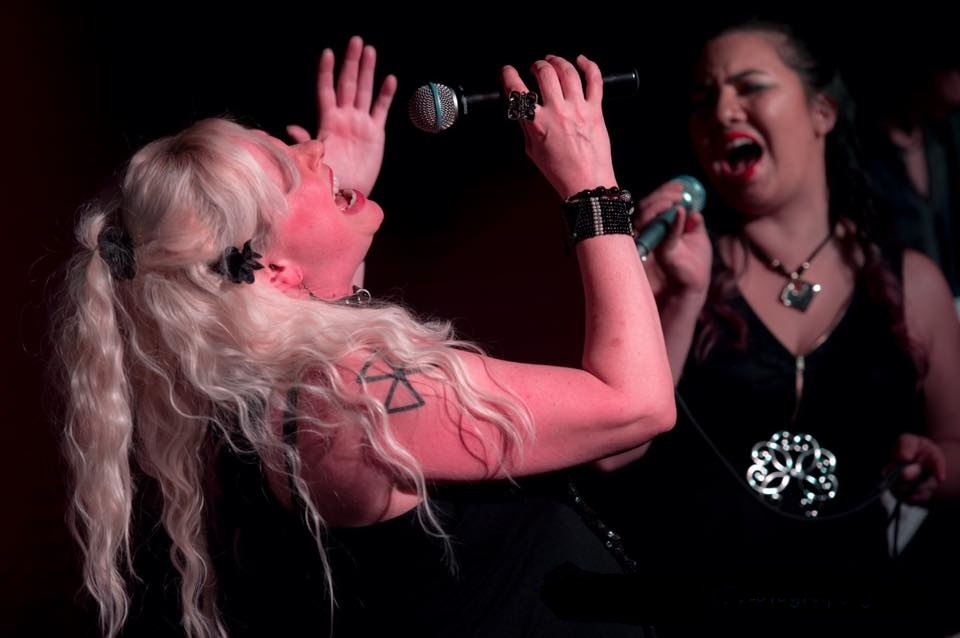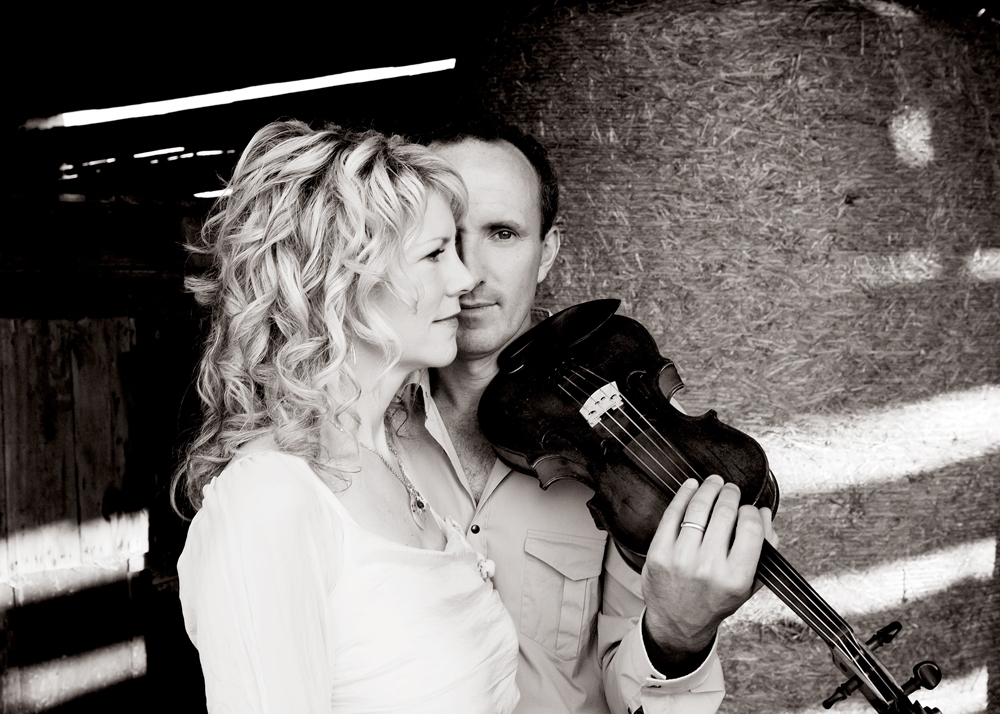
From the Church Choir to Ottawa’s Jezebel, Terry Steeves Lives for the Music
Photos supplied by Terry Steeves.
She is ten years old. Terry Steeves looks down at the little yellow and white record player her parents have just given her. Some gifts provide momentary elation, some collect dust in the attics and garages of the world, others change your life.
Looking back, Steeves had a lot of cogs in the machine moving her towards becoming a musician. It’s as though, even if she wanted to, she couldn’t stop rolling and even if she did put the brakes on all the signs around her pointed in one direction: you have to sing. She started doing just that, joining the church choir when she was seven. Her father was a musician who worked in a music store and, after unwrapping that turntable, his young daughter started using up all her allowance money on 45’s. Her hangout was the Nepean Public Library because it had an amazing record collection on the upper level back when people still treated new vinyl like it was an infant.
“You could pull out albums, hand them to the sound tech in the booth, and they’d give you a set of headphones to listen to the whole record,” says Steeves dreamily lost in the reverie of her younger self.
She recalls the day she first discovered Elton John’s Goodbye Yellow Brick Road. The man and his piano flipped a switch inside the young girl’s head, like a musical awakening of the soul, and armed with rock and roll enlightenment, and the radio, she started to track down musicians whose voices kept that switch always flipped to the ON position.
“The things that really began to jump out at me were the voices, the harmonies, the incredible melodies and rhythms, and the piano and guitar. I guess you just know when music begins to run through your veins because you can’t imagine your life without it…it was constantly in my head.”

Despite growing up in a city of over 800,000, Terry’s universe was made up of people who had names like Stevie Wonder, Elvis Costello, Geddy Lee, Billy Joel, Aretha Franklin, Max Webster and Mick Jagger. No matter where her family moved –and it was quite a lot in her youth– the music followed and settled into whatever new place was to be called home. Well, home to most but, to Steeves, it was all her stage.
Then, suddenly, the switch turned OFF.
She lost interest and her singing voice was silenced at the age of thirteen as she discovered a love of dancing. A passion for singing wouldn’t resurface until later on down the road. At the time, Steeves worked at a bar on Elgin Street called The Bytown Tavern. The place was known for its twice a week karaoke nights and, upstairs, there was a club called The Penguin that hosted blues jams every Thursday night. She was surrounded by music again.
For a girl who used to belt it out in church, her room, wherever there was oxygen, Steeves now found herself too shy to sing. It took the persistent urging of DJ Johnny C to get her up on stage to timidly croon out “Crazy” or “Don’t It Make My Brown Eyes Blue”. Terry was holding back, something even clear to those in the audience watching her through the blurry haze of alcohol.
“Hey, you got a great voice,” one of the regulars told her after another shy song from Steeves. “You just got to project it. Push it out!”
With some newfound confidence, Steeves tried stronger songs reverting back to lessons she’d learned in those church choirs. She started shaking the dust off those vocal chords and the switch started moving upward again. Then, one night, she wandered upstage where Ottawa’s Blues Lady, Maria Hawkins, was wailing out a solo number on stage. However, her next track was Ike and Tina Turner’s “Proud Mary” and Hawkins desperately needed an Ike. Urged by local blues great Larry “the Bird” Mootham, and despite not knowing that version of the tune, Terry slowly stepped on stage where in a matter of seconds she’d watch her world explode and, when the smoke cleared, nothing would be the same again.
“It felt like I’d stepped onto the most adrenaline-pumped roller coaster ride I’d ever been on. It was a combination of the music coming from my heart, soul, and guts, feeling it come pouring out of you in a heat of fire and passion, and experiencing that give-and-take with the audience, that absolutely hooked me for life,” she recalls.
“When I climbed down off that stage, I shook from head to toe, like someone had injected me with some kind of powerful drug. It was right then I made a pact with myself: I was going to become a singer…come hell or high water.”
She soon joined her first band, a 5-piece called Aria, that played covers. Then came a duo called The New Legends, that played covers. The pattern would repeat…another band called The Bruised Egos and another called Sweet Instincts would follow. The big time wasn’t calling any of them but playing weddings, legion halls, lodges, and bars was all just expanding her vocal range, building confidence and, at the bare minimum, at least providing a steady income to make ends meet. After meeting guitarist Rob Rose, Steeves decided it was time to ditch playing other people’s music and start spilling out her soul onto pieces of paper.
“I guess I felt I was onto the next phase of wanting to perform and record my own material,” says Steeves. “Rob would come up with a series of cool riffs that we structured together into verses, bridges, choruses, etc. I found it easy to thread vocal melodies through them because his arrangements were so melodic, and the first lyrics would jump into my head fairly instantly.”
Steeves and Rose were soon joined by Michel Raymond (bass), Ron Card (guitar) and Jean Claude Brien (drums). The lineup would shift a bit, going through a few drummers (recently adding Chris Payne) and adding Jennifer Jean on backing vocals. Now they just needed a name. One night Rob tossed out something that Steeves caught before it even had a chance to hit the ground. It was only one word, Jezebel, but it resonated with Steeves, evoking images and emotions that elevated the name to a greater importance.
“I liked it right away, because it represented the woman who stands up for what she believes in, is not afraid to show her true colours, takes risks, and is accepting of others,” says Steeves who suggest people read Lesley Hazelton’s book Jezebel: The Untold Story of the Bible’s Harlot Queen to see another side to the story of the band’s namesake.
After a few gigs, interest in the band started to pick up and soon they were playing shows at The Rainbow, Moose McGuire’s and Zaphod’s. The message was clear: there’s a new kick ass rock band in Ottawa and when Steeve’s steps to the mic you only have a few seconds to hold onto something before she blows you away.
Though formed in 2013, it took Jezebel a few years to work towards a debut album. It allowed the songs to form on stage, something that made for a smoother progression when they would eventually find spots on What Are You Made Of?. The result is a powerful throwback to ‘70s/‘80s rock. Dipped in Heart, the album splashes on some beautiful dirty glam lost to a lot of the spick and span polish on music today. Steeves channels Janis Joplin by way of Lee Aaron and the only thing missing is the size of Lita Ford’s hair.
“Whatever the sound happens to be, it was never the intention to sound like anything or anyone in particular,” Steeves tells Ottawa Life.
“I guess I’d have to say it’s just a reflection of lifelong influences that have something to do with the way I like a melody to sound. I like texture, contrasts of soft and strong, various rhythmic changes, long vocal sustains, stops and starts, a variety of tempos, and a good spectrum of vocal range. They all help to build really interesting songs to listen to, without getting too complicated or too much for the listener to wrap their head around.”
Many of the songs that make up What Are You Made Of? are deeply personal to Steeves. Songs like “Danger Zone” and “Perfect” reflect her views on drug addiction and the fashion industry while a song like “Sing On” reflects upon the good, the bad and everything in between. She dove into the dark of herself to bring back what needed to come up into the light. The pieces of an abusive relationship, walking away from an 11-year musical partnership, loneliness, uncertainty, these are the things that moved with her on these tracks. Steeves doesn’t try to run. In fact, the music boldly faces the past and dares it to take her down.
“Despite the fact that I was freed of both constricting, debilitating, and stagnating situations, I also felt an uneasy sense of disorientation at suddenly being cast out on my own. I didn’t really know who I was, had a low self-esteem, and didn’t know where to put my energy. I eventually found it again in spades, with the real healer being the music and creativity that’s kept me propelling along.”
Steeves says the songs became therapy, a way to purge out unwanted emotional baggage and though she still gets preshow jitters the music quickly dispels that. She finds herself transformed, riding a wave of connection between her, the band and the audience no matter what size room she is playing to. The girl who started out singing church hymns is now the woman ready to rock you through the walls of any venue stable enough to host her.
“I hope people really just enjoy the music and are moved by its textures and grooves. If others find a connection there that helps whatever they’re going through, then that is a real accomplishment.”











